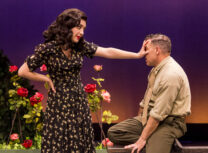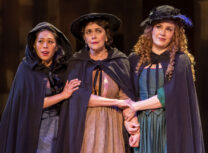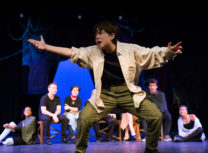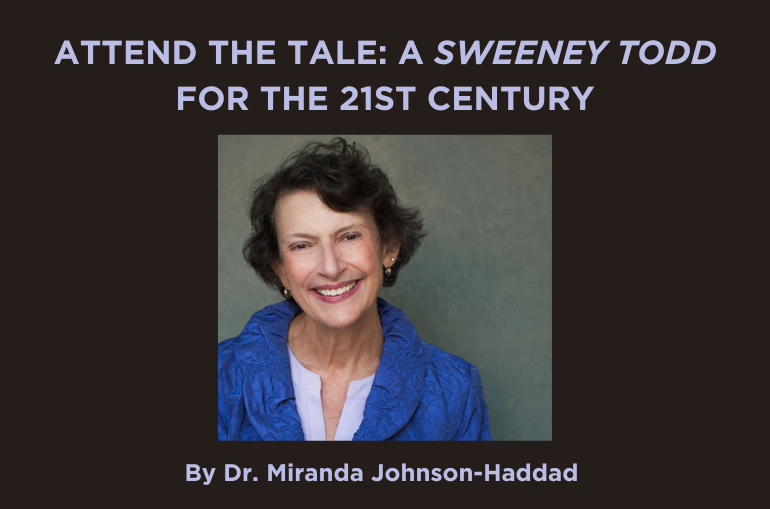Director’s Corner
By A Noise Within
March 7, 2015
Mary Jo DuPrey directs a special Words Within’s reading of Beaumarchais’ The Barber of Seville on Wednesday, April 8 at 7pm. We talked with her about this much-anticipated event.
Q: Mary Jo, you’ve known about our Company for some time, right?
A: Yes! But this is my first time directing for A Noise Within, and I’m so thrilled to be working with this absolutely incredible company of actors whom I have admired for so long.
Q: When did you first see one of our shows?
A: I’ve been attending A Noise Within plays since they first started, from your Glendale beginnings till now, and it’s been an inspiration to see the Company grow. I went to Vassar with my dear friend Steve Rockwell, who is one of the earliest members of the company, so I’ve always kept it on my radar. I’ve had the pleasure to work previously with Bill Hunt and Alan Blumenfeld at other venues, and I just can’t wait to work with them again.
Q: Which of our shows have you liked the best?
A: Some of the shows that stand out in my memory are The Taming of The Shrew, which was really one of the best I’ve ever seen. I also loved Awake and Sing!, which Alan was in along with another Vassar friend Daniel Reichert, who has often worked with the company. That’s when I completely fell in professional love with Deborah Strang. I also loved your Waiting for Godot. Though I’ve often read and revisited this play over the years, the production at A Noise Within illuminated parts of the text that had often remained a little illusive for me. More recently, I enjoyed The Grapes of Wrath. I really admire Michael Michetti’s work, and it’s always a pleasure to see what he’s doing. I’ve enjoyed so many of your plays, but those are some that stand out.
Q: Mary Jo, many of us know there’s a Figaro and Barber connection lurking somewhere, but can’t quite recall what it is. Shed light, please!
A: Well, The Barber of Seville is the first of a trilogy of plays including The Marriage of Figaro and then The Guilty Mother, which has a more serious tone to it. The plays follow Figaro, his peers and his supposed superiors in a series of life events that Beaumarchais wrote to examine, question and protest the social status quo. Figaro is of the lower classes, but he’s actually smarter and more resourceful than the aristocracy he serves. This may not sound very scandalous an idea now, but at the time, it bordered on treason. Barber was banned at first, as Beaumarchais was questioning even the moral character of the upper classes. Little known fact: though the play was banned because the King thought it a dangerous, subversive piece, Queen Marie Antoinette adored it and put it on at Versailles. She played Rosine! She was actually the first woman to play this very famous role. Essentially, what remains important about these plays is the willingness to speak to power. Though we enjoy this freedom today in our country, I think it’s important to remember that a majority of people living in this world do not, and if people don’t think a play can carry the power to change minds and hearts, remembering that the King of France thought so enough to stop its performance is proof positive that drama, especially satire, in this case, carries enormous power.
Q: Pretty heady stuff! May we turn to the light side now?
A: Of course. Now, Barber is downright funny. Mel Brooks once said that his biggest revenge against Adolf Hitler was to make an international fool and laughing stock out of him. Barber draws on styles from the Commedia dell’Arte and Molière, and I think those styles of comedy never lose their appeal. They are very specific to live theater, and though television and film have brought us wonderful new forms of contemporary comedy, these old forms are still so fun all still important plays, politically, and Beaumarchais effectively sneaks his message in with humor.
Q: Our patrons love our resident artist readings. Why do they mean so much?
A: Readings provide a special forum for intellectual discussion. I think they give an audience a chance to do what I most loved in theater school, that is, dig in and really discuss the text. As actors and directors we get to do this in rehearsal, and it is part of the process I enjoy most. The audience may really enjoy the work, glean the intention of the piece, but when you get to discuss it with everyone involved, you may get to see and learn more about the history and deeper layers of the text that can come to light when you engage in a deeper discussion. I always enjoy hearing what the audience really got from it. Most of the time, after a show, people will come and say, “Oh, I really liked it.” But at a reading, you can learn in way more detail how the piece affected someone, what they think about the play. Then you can see if it actually is a play that has stood the test of time, if it still asks the questions that are important today.
Q: Thank you, Mary Jo. We can’t wait!
A: Me, too. This a marvelous play, and the reading will be wonderful, I promise.
Please click here for more information on our Words Within Resident Artists’ Reading Series and we hope to see you on April 8th!








